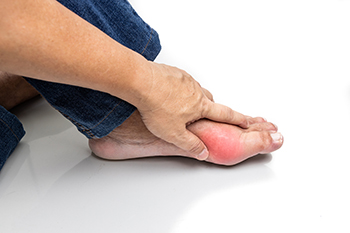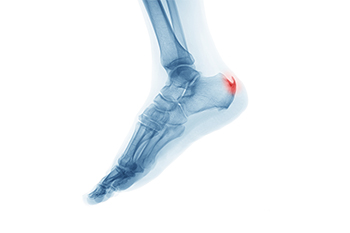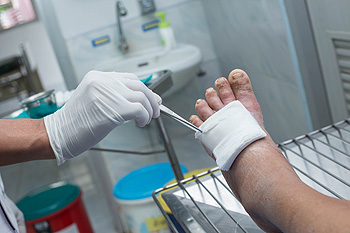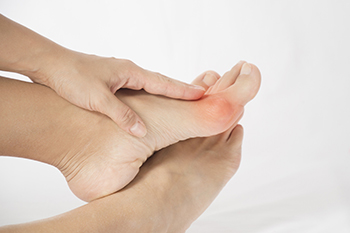Can Certain Medical Conditions Lead To Gout?
 Did you know gout is a form of arthritis? It is known to cause severe pain and discomfort, and it is often difficult to walk. It can develop as a result of excess uric acid that forms in the joints of the big toe. This can happen due to genetic reasons, or from eating foods that have high levels of purines. These types of foods can include shellfish, red meat, or it may come from drinking excessive amounts of alcohol. There may be existing medical conditions that can lead to the onset of gout, such as high blood pressure, diabetes, or kidney disorders. The symptoms that many patients experience can be tender joints in the big toe, excruciating pain, and the affected area is often tender and hot. If you have symptoms of gout, it is strongly advised that you are under the care of a podiatrist who can properly treat this condition.
Did you know gout is a form of arthritis? It is known to cause severe pain and discomfort, and it is often difficult to walk. It can develop as a result of excess uric acid that forms in the joints of the big toe. This can happen due to genetic reasons, or from eating foods that have high levels of purines. These types of foods can include shellfish, red meat, or it may come from drinking excessive amounts of alcohol. There may be existing medical conditions that can lead to the onset of gout, such as high blood pressure, diabetes, or kidney disorders. The symptoms that many patients experience can be tender joints in the big toe, excruciating pain, and the affected area is often tender and hot. If you have symptoms of gout, it is strongly advised that you are under the care of a podiatrist who can properly treat this condition.
Gout is a painful condition that can be treated. If you are seeking treatment, contact Dr. Steven Shlonsky from Louisville, Kentucky. Dr. Shlonsky will treat your foot and ankle needs.
What Is Gout?
Gout is a form of arthritis that is characterized by sudden, severe attacks of pain, redness, and tenderness in the joints. The condition usually affects the joint at the base of the big toe. A gout attack can occur at any random time, such as the middle of the night while you are asleep.
Symptoms
- Intense Joint Pain - Usually around the large joint of your big toe, and it most severe within the first four to twelve hours
- Lingering Discomfort - Joint discomfort may last from a few days to a few weeks
- Inflammation and Redness -Affected joints may become swollen, tender, warm and red
- Limited Range of Motion - May experience a decrease in joint mobility
Risk Factors
- Genetics - If family members have gout, you’re more likely to have it
- Medications - Diuretic medications can raise uric acid levels
- Gender/Age - Gout is more common in men until the age of 60. It is believed that estrogen protects women until that point
- Diet - Eating red meat and shellfish increases your risk
- Alcohol - Having more than two alcoholic drinks per day increases your risk
- Obesity - Obese people are at a higher risk for gout
Prior to visiting your podiatrist to receive treatment for gout, there are a few things you should do beforehand. If you have gout you should write down your symptoms--including when they started and how often you experience them, important medical information you may have, and any questions you may have. Writing down these three things will help your podiatrist in assessing your specific situation so that he or she may provide the best route of treatment for you.
If you have any questions, please feel free to contact our office located in Louisville, KY . We offer the newest diagnostic and treatment technologies for all your foot care needs.
Swelling May Accompany a Heel Spur
 A calcium deposit that forms between the arch of the foot and the heel is referred to as a heel spur. Common symptoms can include heel pain first thing in the morning, followed by a dull ache for the rest of the day. Some patients notice swelling at the front of the heel, and it may feel warm. The heel spur will be visible on an X-ray, and this is a necessary test to have in determining what the proper treatment is. Heel spurs can develop as a result of the aging process when the soft tissue wears thin. People who frequently run may experience this condition, as the heel pad loses shock absorption. Relief may come from elevating the affected foot as often as possible, and this can help to reduce swelling. Additionally, wearing shoes that have a cushion may help to ease the pain that can come from having a heel spur. Many patients who have heel spurs find it is difficult to complete daily activities. If this applies to you or someone you know, it is strongly suggested that you consult with a podiatrist.
A calcium deposit that forms between the arch of the foot and the heel is referred to as a heel spur. Common symptoms can include heel pain first thing in the morning, followed by a dull ache for the rest of the day. Some patients notice swelling at the front of the heel, and it may feel warm. The heel spur will be visible on an X-ray, and this is a necessary test to have in determining what the proper treatment is. Heel spurs can develop as a result of the aging process when the soft tissue wears thin. People who frequently run may experience this condition, as the heel pad loses shock absorption. Relief may come from elevating the affected foot as often as possible, and this can help to reduce swelling. Additionally, wearing shoes that have a cushion may help to ease the pain that can come from having a heel spur. Many patients who have heel spurs find it is difficult to complete daily activities. If this applies to you or someone you know, it is strongly suggested that you consult with a podiatrist.
Heel spurs can be incredibly painful and sometimes may make you unable to participate in physical activities. To get medical care for your heel spurs, contact Dr. Steven Shlonsky from Louisville, Kentucky. Dr. Shlonsky will do everything possible to treat your condition.
Heels Spurs
Heel spurs are formed by calcium deposits on the back of the foot where the heel is. This can also be caused by small fragments of bone breaking off one section of the foot, attaching onto the back of the foot. Heel spurs can also be bone growth on the back of the foot and may grow in the direction of the arch of the foot.
Older individuals usually suffer from heel spurs and pain sometimes intensifies with age. One of the main condition's spurs are related to is plantar fasciitis.
Pain
The pain associated with spurs is often because of weight placed on the feet. When someone is walking, their entire weight is concentrated on the feet. Bone spurs then have the tendency to affect other bones and tissues around the foot. As the pain continues, the feet will become tender and sensitive over time.
Treatments
There are many ways to treat heel spurs. If one is suffering from heel spurs in conjunction with pain, there are several methods for healing. Medication, surgery, and herbal care are some options.
If you have any questions feel free to contact our office located in Louisville, KY . We offer the latest in diagnostic and treatment technology to meet your needs.
Top 9 Foot Care Tips for Elderly Adults
If you are a caregiver for an aging adult, helping them take care of their feet can help keep them healthy, active and improve their quality of life. Healthy feet can also help older adults avoid falls and broken bones. Here are the top nine things you can do to promote better foot health in an elderly person. 1) Inspect their feet daily for any redness, breaks in the skin or anything unusual. 2) Help them eat healthy foods, drink plenty of water, and engage in low impact exercise and stretching. 3) Trim their toenails straight across. 4) Make sure footwear fits properly, and have their feet measured for length and width every time they buy new shoes. 5) Don’t allow them to walk barefoot, even around the house. 6) Keep their feet clean, dry, and moisturized. 7) Make sure their socks are not tight to avoid cutting off circulation. 8) Never trim corns or calluses with a sharp instrument. 9) Have their feet checked regularly by a podiatrist, especially if they are diabetic.
If you need your feet checked, contact Dr. Steven Shlonsky of Louisville, Kentucky. Dr. Shlonsky will attend to all of your foot and ankle needs and provide you with quality treatment.
Geriatrics and Podiatry
When people age, some common issues that may occur are bone density loss, dry skin, poor circulation, and rough brittle nails. These issues may also affect your foot health if the necessary steps are not taken to alleviate the problems.
It is important to take care of your feet because feet that are injured or diseased can affect your overall health. Having painful feet hinders your ability to do daily activities or may decrease your willingness to do the things that you need to do.
Visiting Your Geriatrician
As we age, health problems become more likely, so it is essential to visit your doctor for check-ups to ensure that you are doing the best you can to take care of your health. It is recommended to check your feet frequently for any possible cuts, bruises, swelling, corns or any other irregularities.
Taking Care of Elderly Feet
Cracked or dry feet can be treated by applying moisturizer often. It is also important not to wear old socks because the older the sock is, the higher the possibility there will be that there is bacteria there. Wear fresh socks and make sure they fit properly.
Proper foot health means that you can have a more active lifestyle and you will not be bogged down by pain. Foot health also leads to good circulation, which is paramount for overall health.
If you have any questions, please feel free to contact our office located in Louisville, KY . We offer the newest diagnostic tools and technology to treat your foot and ankle needs.
Why Diabetes and Podiatry Go Together
 There are a variety of complications to the feet that diabetes can cause, and some of them can even lead to amputation. These problems occur because diabetic patients are prone to losing the sensation in their feet, making it difficult to notice problems in their early stages. Diabetes can also cause poor blood flow in the feet, which ultimately leads to both numbness and a slower healing process for wounds. This is why it is important for diabetic patients to develop a foot care routine that includes checking the feet every day for wounds and sores, keeping the feet clean, keeping the skin soft and smooth, and finding properly fitting footwear. Regular checkups with a podiatrist are also suggested for diabetic patients. Anyone with diabetes who has further questions or concerns shouldn’t hesitate to consult with a podiatrist near them.
There are a variety of complications to the feet that diabetes can cause, and some of them can even lead to amputation. These problems occur because diabetic patients are prone to losing the sensation in their feet, making it difficult to notice problems in their early stages. Diabetes can also cause poor blood flow in the feet, which ultimately leads to both numbness and a slower healing process for wounds. This is why it is important for diabetic patients to develop a foot care routine that includes checking the feet every day for wounds and sores, keeping the feet clean, keeping the skin soft and smooth, and finding properly fitting footwear. Regular checkups with a podiatrist are also suggested for diabetic patients. Anyone with diabetes who has further questions or concerns shouldn’t hesitate to consult with a podiatrist near them.
Diabetic foot care is important in preventing foot ailments such as ulcers. If you are suffering from diabetes or have any other concerns about your feet, contact Dr. Steven Shlonsky from Louisville, Kentucky. Dr. Shlonsky can provide the care you need to keep you pain-free and on your feet.
Diabetic Foot Care
Diabetes affects millions of people every year. The condition can damage blood vessels in many parts of the body, especially the feet. Because of this, taking care of your feet is essential if you have diabetes, and having a podiatrist help monitor your foot health is highly recommended.
The Importance of Caring for Your Feet
- Routinely inspect your feet for bruises or sores.
- Wear socks that fit your feet comfortably.
- Wear comfortable shoes that provide adequate support.
Patients with diabetes should have their doctor monitor their blood levels, as blood sugar levels play such a huge role in diabetic care. Monitoring these levels on a regular basis is highly advised.
It is always best to inform your healthcare professional of any concerns you may have regarding your feet, especially for diabetic patients. Early treatment and routine foot examinations are keys to maintaining proper health, especially because severe complications can arise if proper treatment is not applied.
If you have any questions please feel free to contact our office located in Louisville, KY . We offer the newest diagnostic and treatment technologies for all your foot and ankle needs.
Faulty Pronation Can Cause Foot Problems
Pronation, a natural part of walking and running, specifically involves how you place the heel on the ground and the subsequent transfer of weight to the rest of your foot. People with normal pronation have a normal arch and the weight is transferred in line. People with flat feet generally overpronate, causing the arch to roll inward. With underpronation, the foot rolls outward as the weight is distributed. Many foot problems are associated with over- or under-pronation. Among them are bunions, arch pain, plantar fasciitis, Achilles tendonitis, calluses and corns, ankle sprains and hammertoe. You may have pronation problems if your heels or knees turn inward while standing, if you develop bunions or flat feet, or if you wear out the soles and heels of your shoes quickly. Obesity, pregnancy or repetitive pounding of the feet on a hard surface contribute to the problem, along with wearing high heels and standing for long periods in them. One solution for pronation problems is wearing custom orthotics to help distribute the weight properly. A visit to your podiatrist is suggested to have a full diagnosis of your gait and consequent foot problems, and to be fitted for the appropriate shoe inserts.
If you have any concerns about your feet, contact Dr. Steven Shlonsky from Louisville, Kentucky. Dr. Shlonsky can provide the care you need to keep you pain-free and on your feet.
Biomechanics in Podiatry
Podiatric biomechanics is a particular sector of specialty podiatry with licensed practitioners who are trained to diagnose and treat conditions affecting the foot, ankle and lower leg. Biomechanics deals with the forces that act against the body, causing an interference with the biological structures. It focuses on the movement of the ankle, the foot and the forces that interact with them.
A History of Biomechanics
- Biomechanics dates back to the BC era in Egypt where evidence of professional foot care has been recorded.
- In 1974, biomechanics gained a higher profile from the studies of Merton Root, who claimed that by changing or controlling the forces between the ankle and the foot, corrections or conditions could be implemented to gain strength and coordination in the area.
Modern technological improvements are based on past theories and therapeutic processes that provide a better understanding of podiatric concepts for biomechanics. Computers can provide accurate information about the forces and patterns of the feet and lower legs.
Understanding biomechanics of the feet can help improve and eliminate pain, stopping further stress to the foot.
If you have any questions please feel free to contact our office located in Louisville, KY . We offer the newest diagnostic and treatment technologies for all your foot and ankle needs.










